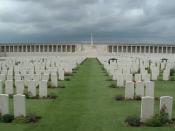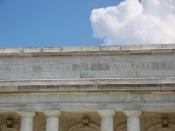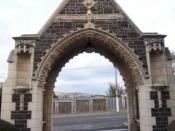Owen captured the horrors of war in his poem "Dulce Et Decorum Est." The glorified status of warriors has been an enduring phenomenon probably since the beginning of mankind. There is a functional necessity that works to keep this idea operating. Injury or death are, neither one, appealing to the average person. But the defense of a tribe, community, or nation requires that some people reject their natural instinct for self-preservation and be willing to sacrifice life or limb. Thus pride and patriotism are born, and it becomes honorable for men to die for their country. Owen, however, delivered the perspective of the "grunt" who has experienced the realities of war. He does not see the honor in his duty or in the death of the man who perished in battle. He sees only the drudgery, pain and senselessness.
The final lines of Owen's poem are "Dulce et decorum est pro patria mori." These are Latin words quoted from the Roman poet Horace's Odes which mean "It is sweet and appropriate to die for one's country." Horace undoubtedly embraced the warrior ideal. There is something to be said for the preservation of these words in their original, Latin form. They add a feeling of antiquity and wisdom - maybe even credibility and truth. Owens, however, added a precursor to these lines that revealed his sentiments. He wrote simply and precisely, "The old Lie: Dulce et decorum est pro patria mori." Owen's message was emphasized by retaining the untranslated Latin phrase





